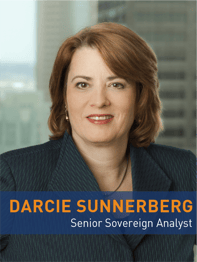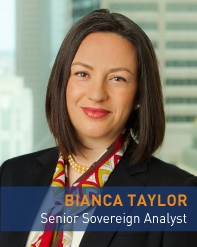Geopolitics
|
|
 "In country after country, we are seeing populations continue to move down a divisive nationalist path - the extremes may gain traction while the middle ground gets hollowed out. This will likely cause challenges for governing bodies to keep unrest at bay and bring new policy to bear. How will this stronger growth in the short term be paid for in the long term?" "In country after country, we are seeing populations continue to move down a divisive nationalist path - the extremes may gain traction while the middle ground gets hollowed out. This will likely cause challenges for governing bodies to keep unrest at bay and bring new policy to bear. How will this stronger growth in the short term be paid for in the long term?"
— Elaine Stokes, Portfolio Manager, full discretion team
|
Europe
|
|
 "European political dynamics will take center stage in 2017. Markets are likely going to be keenly sensitive to the performance of populist parties in upcoming elections in "core" countries like the Netherlands, France, and Germany. The evolution of UK/EU Brexit negotiations will also be key, with the UK aiming to start the process in the first quarter of the new year. The consequences of Italy's rejection of the constitutional referendum will also carry into the new year, as policymakers wrestle with stress on the banking system from the large overhang of non-performing loans, persistently low economic growth and bank profitability, and the increasing capital gains of some banks, all while trying to avoid forcing losses onto retail bondholders." "European political dynamics will take center stage in 2017. Markets are likely going to be keenly sensitive to the performance of populist parties in upcoming elections in "core" countries like the Netherlands, France, and Germany. The evolution of UK/EU Brexit negotiations will also be key, with the UK aiming to start the process in the first quarter of the new year. The consequences of Italy's rejection of the constitutional referendum will also carry into the new year, as policymakers wrestle with stress on the banking system from the large overhang of non-performing loans, persistently low economic growth and bank profitability, and the increasing capital gains of some banks, all while trying to avoid forcing losses onto retail bondholders."
— Laura Sarlo, Senior Sovereign Analyst
|
Emerging Markets
|
|
 "Emerging markets investors should differentiate carefully in 2017 as we see both negatives and positives looming. Stable global growth, supported by signs of improvement in the United States, would be good for emerging markets in general. However, higher Treasury yields and a stronger US dollar resulting from changes in US fiscal policy, could create negative sentiment for emerging markets. We will continue to look for value in commodity stories - not just main stream copper, aluminum and oil - but also zinc and tin. Country-by-country, we will also be looking closely at political reform, geopolitical risk, world trade flows, and of course relative value. India, Indonesia, Brazil and South Africa may be of particular interest in 2017." "Emerging markets investors should differentiate carefully in 2017 as we see both negatives and positives looming. Stable global growth, supported by signs of improvement in the United States, would be good for emerging markets in general. However, higher Treasury yields and a stronger US dollar resulting from changes in US fiscal policy, could create negative sentiment for emerging markets. We will continue to look for value in commodity stories - not just main stream copper, aluminum and oil - but also zinc and tin. Country-by-country, we will also be looking closely at political reform, geopolitical risk, world trade flows, and of course relative value. India, Indonesia, Brazil and South Africa may be of particular interest in 2017."
— Elisabeth Colleran, Portfolio Manager, emerging markets team
|
Corporate Bonds
|
|
 "While the election of Donald Trump has resulted in some wild repricing across markets, we continue to remain favorable on corporate bonds for three reasons: "While the election of Donald Trump has resulted in some wild repricing across markets, we continue to remain favorable on corporate bonds for three reasons:
1. The bulk of the near-term rate rise appears complete, while the expected boost to growth and inflation from Trump's tax and infrastructure plans will probably not occur until 2018
2. Trump's plan to allow companies to repatriate offshore funds at reduced tax rates, as well as the likelihood that companies will operate cautiously in this uncertain environment, may result in lower corporate bond supply
3. Higher rates will continue to encourage investment from global investors seeking higher yields"
— Scott Service, Portfolio Manager, global fixed income team
|
Equities
|
|
 "The prospects for corporate tax reform and infrastructure spending have brightened equity market expectations following the US election. For the first time in quite a while, Washington could be a source of positive earnings catalysts in the months ahead. Both large-cap and smaller cap stocks may be poised to benefit from policy changes and this broadening of equity market leadership should be a good thing all around." "The prospects for corporate tax reform and infrastructure spending have brightened equity market expectations following the US election. For the first time in quite a while, Washington could be a source of positive earnings catalysts in the months ahead. Both large-cap and smaller cap stocks may be poised to benefit from policy changes and this broadening of equity market leadership should be a good thing all around."
— Richard Skaggs, Senior Equity Strategist
|
Mortgage Market
|
|
 "The recent rise in 10-year US Treasury rates of over three quarters of a percent since the end of September, may present opportunities in the mortgage market. I believe prices may shift from being premium to discounted. This could offer investors like us the chance to invest in high quality, liquid securities with attractive return profiles." "The recent rise in 10-year US Treasury rates of over three quarters of a percent since the end of September, may present opportunities in the mortgage market. I believe prices may shift from being premium to discounted. This could offer investors like us the chance to invest in high quality, liquid securities with attractive return profiles."
— Chris Harms, Portfolio Manager, relative return team
|
Russia
|
|
 "In my view, the needle has moved slightly more favorably for Russia. Support for continued sanctions against Russia is declining in the west and despite German Chancellor Merkel’s commitment to maintaining the sanctions, she seems to be losing support across the EU, particularly in Italy and France. Brexit has removed the UK as a strong ally to Merkel in this fight. As for the US, President-elect Trump has hinted at some degree of cooperation with Russia, though nothing is definitive yet." "In my view, the needle has moved slightly more favorably for Russia. Support for continued sanctions against Russia is declining in the west and despite German Chancellor Merkel’s commitment to maintaining the sanctions, she seems to be losing support across the EU, particularly in Italy and France. Brexit has removed the UK as a strong ally to Merkel in this fight. As for the US, President-elect Trump has hinted at some degree of cooperation with Russia, though nothing is definitive yet."
—Darcie Sunnerberg, Senior Sovereign Analyst
|
Mexico
|
|
 "I expect lower growth and continued weakness in the peso for 2017. President-elect Donald Trump has brought uncertainty to emerging markets and Mexico in particular. The Mexican peso has depreciated 10% since the US election and its recovery will depend largely on whether President-elect Trump pushes through with tariffs on Mexican goods. Until we have clarity as to what the new administration’s actual trade reform will look like, both domestic and foreign investments into the country are likely to stagnate." "I expect lower growth and continued weakness in the peso for 2017. President-elect Donald Trump has brought uncertainty to emerging markets and Mexico in particular. The Mexican peso has depreciated 10% since the US election and its recovery will depend largely on whether President-elect Trump pushes through with tariffs on Mexican goods. Until we have clarity as to what the new administration’s actual trade reform will look like, both domestic and foreign investments into the country are likely to stagnate."
—Bianca Taylor, Senior Sovereign Analyst
|
Liability Driven Investing
|
|
 "In my view, 2016 is ending on a positive note for corporate pension plans. A rally in risk assets and a sudden jump in long-term treasury rates in November has created a favorable outcome for pension plans. Most will be seeing an uptick in funding ratio. This may be a big relief for pension plans struggling with low interest rates, revision of mortality assumptions and increased Pension Benefit Guaranty Corporation (PBGC) premiums. Looking forward to 2017, I expect to see an increased momentum for Liability Driven Investing (LDI) strategies. Pension plans with a well-designed glide path could be hitting de-risking triggers and increasing allocation to hedging assets, while others, still on the sideline may be willing to jump in." "In my view, 2016 is ending on a positive note for corporate pension plans. A rally in risk assets and a sudden jump in long-term treasury rates in November has created a favorable outcome for pension plans. Most will be seeing an uptick in funding ratio. This may be a big relief for pension plans struggling with low interest rates, revision of mortality assumptions and increased Pension Benefit Guaranty Corporation (PBGC) premiums. Looking forward to 2017, I expect to see an increased momentum for Liability Driven Investing (LDI) strategies. Pension plans with a well-designed glide path could be hitting de-risking triggers and increasing allocation to hedging assets, while others, still on the sideline may be willing to jump in."
— Ankit Agarwal, Quantitative Analyst
|
Bank Loans
|
|
 "2016 was a strong year for the bank loan market, with returns up about 8.5% as of November 30. With interest rates on the rise, on top of the steeper yield curve we've seen since the election, bank loans may merit a place in a careful asset allocation plan. President-elect Trump's regulatory approach may be somewhat favorable to loan supply in 2017, as restrictions on banks appear likely to ease, which could also help keep bank loan default rates low." "2016 was a strong year for the bank loan market, with returns up about 8.5% as of November 30. With interest rates on the rise, on top of the steeper yield curve we've seen since the election, bank loans may merit a place in a careful asset allocation plan. President-elect Trump's regulatory approach may be somewhat favorable to loan supply in 2017, as restrictions on banks appear likely to ease, which could also help keep bank loan default rates low."
—Cheryl Stober, Product Manager, bank loan team
|
US Banks
|
|
 "US banks will be likely be laser focused on two things in 2017: interest rate increases and the possibility that banking regulation will be eased under the new administration. Higher interest rates, as well as a steeper yield curve, would likely boost net interest margins and net interest income, which is all positive for banks. Likewise, eased regulation could reduce restrictions on areas like trading and investing, which could also allow revenues to climb. However, bondholders like us will be cautious on the degree of regulatory easing as too much reversal of the current requirements, that have boosted balance sheet strength, could be a real negative for bondholders." "US banks will be likely be laser focused on two things in 2017: interest rate increases and the possibility that banking regulation will be eased under the new administration. Higher interest rates, as well as a steeper yield curve, would likely boost net interest margins and net interest income, which is all positive for banks. Likewise, eased regulation could reduce restrictions on areas like trading and investing, which could also allow revenues to climb. However, bondholders like us will be cautious on the degree of regulatory easing as too much reversal of the current requirements, that have boosted balance sheet strength, could be a real negative for bondholders."
—Elizabeth Schroeder, Senior Credit Analyst
|
European Banks
|
|
 "In my view, European banks do not have quite as rosy picture ahead of them as US banks who may benefit from higher interest rates and softer regulation under the Trump administration. Brexit is causing uncertainty about the UK economic outlook; Italian banks are struggling to reduce their large stock of non-performing loans; euro zone short-term interest rates are likely to stay negative; and a series of elections next year, including in France and Germany, could pose significant risk to the solidity of the euro zone. When investing in global banks, it might be the case that there’s no place like home." "In my view, European banks do not have quite as rosy picture ahead of them as US banks who may benefit from higher interest rates and softer regulation under the Trump administration. Brexit is causing uncertainty about the UK economic outlook; Italian banks are struggling to reduce their large stock of non-performing loans; euro zone short-term interest rates are likely to stay negative; and a series of elections next year, including in France and Germany, could pose significant risk to the solidity of the euro zone. When investing in global banks, it might be the case that there’s no place like home."
— Julian Wellesley, Senior Analyst, global equity opportunities team
|
Technology consulting
|
|
 "In my view, information technology consulting firms are grappling with tectonic shifts in their businesses and can no longer count on successes based purely on outsourcing and other related activities. Clients are demanding much more including digital, cloud and security services — all crucial capabilities that Fortune 1000 companies need to successfully adapt their business models. The information technology consulting industry is highly fragmented and I expect quite a significant divergence between winners and losers in 2017." "In my view, information technology consulting firms are grappling with tectonic shifts in their businesses and can no longer count on successes based purely on outsourcing and other related activities. Clients are demanding much more including digital, cloud and security services — all crucial capabilities that Fortune 1000 companies need to successfully adapt their business models. The information technology consulting industry is highly fragmented and I expect quite a significant divergence between winners and losers in 2017."
— Rob Forker, Senior Global Specialist, global equity opportunities team
|
Telecom and cable
|
|
 "I expect the new Republican administration will offer substantial regulatory relief for the telecom and cable network operators. Already, Federal Communications Commission (FCC) proposals to share proprietary set-top box design and reduce fees for business network services have been withdrawn. New consumer privacy rules that just passed last month will likely be scrapped. Even more importantly, net neutrality rules will likely be reversed allaying fears of potential broadband pricing regulation down the road. Combined, both actions should allow the industry to reap higher returns on investment and encourage greater spending on network infrastructure and customer premise equipment going forward. Furthermore, judging by Trump’s appointees and transition team members so far, conditions for industry consolidation could ease. Taken together, these developments could result in a boon for the cable/telecom industry." "I expect the new Republican administration will offer substantial regulatory relief for the telecom and cable network operators. Already, Federal Communications Commission (FCC) proposals to share proprietary set-top box design and reduce fees for business network services have been withdrawn. New consumer privacy rules that just passed last month will likely be scrapped. Even more importantly, net neutrality rules will likely be reversed allaying fears of potential broadband pricing regulation down the road. Combined, both actions should allow the industry to reap higher returns on investment and encourage greater spending on network infrastructure and customer premise equipment going forward. Furthermore, judging by Trump’s appointees and transition team members so far, conditions for industry consolidation could ease. Taken together, these developments could result in a boon for the cable/telecom industry."
— Janet Sung, Senior Credit Research Analyst
|
Autos
|
|
 "I expect to see growing risks to the auto market. This is the likely result of three items — escalating spending on consumer incentives, falling used car prices, and greater use of leasing and extended payments. However, I firmly believe the negative impact on the automakers should be mitigated by the positive impact of huge productivity enhancements that have been implemented across the industry over the last decade." "I expect to see growing risks to the auto market. This is the likely result of three items — escalating spending on consumer incentives, falling used car prices, and greater use of leasing and extended payments. However, I firmly believe the negative impact on the automakers should be mitigated by the positive impact of huge productivity enhancements that have been implemented across the industry over the last decade."
— Steve Bocamazo, Associate Director of Credit Research
|



 "In country after country, we are seeing populations continue to move down a divisive nationalist path - the extremes may gain traction while the middle ground gets hollowed out. This will likely cause challenges for governing bodies to keep unrest at bay and bring new policy to bear. How will this stronger growth in the short term be paid for in the long term?"
"In country after country, we are seeing populations continue to move down a divisive nationalist path - the extremes may gain traction while the middle ground gets hollowed out. This will likely cause challenges for governing bodies to keep unrest at bay and bring new policy to bear. How will this stronger growth in the short term be paid for in the long term?" "
" "
" "While the election of Donald Trump has resulted in some wild repricing across markets, we continue to remain favorable on corporate bonds for three reasons:
"While the election of Donald Trump has resulted in some wild repricing across markets, we continue to remain favorable on corporate bonds for three reasons: "The prospects for corporate tax reform and infrastructure spending have brightened equity market expectations following the US election. For the first time in quite a while, Washington could be a source of positive earnings catalysts in the months ahead. Both large-cap and smaller cap stocks may be poised to benefit from policy changes and this broadening of equity market leadership should be a good thing all around."
"The prospects for corporate tax reform and infrastructure spending have brightened equity market expectations following the US election. For the first time in quite a while, Washington could be a source of positive earnings catalysts in the months ahead. Both large-cap and smaller cap stocks may be poised to benefit from policy changes and this broadening of equity market leadership should be a good thing all around." "
" "In my view, the needle has moved slightly more favorably for Russia. Support for continued sanctions against Russia is declining in the west and despite German Chancellor Merkel’s commitment to maintaining the sanctions, she seems to be losing support across the EU, particularly in Italy and France. Brexit has removed the UK as a strong ally to Merkel in this fight. As for the US, President-elect Trump has hinted at some degree of cooperation with Russia, though nothing is definitive yet
"In my view, the needle has moved slightly more favorably for Russia. Support for continued sanctions against Russia is declining in the west and despite German Chancellor Merkel’s commitment to maintaining the sanctions, she seems to be losing support across the EU, particularly in Italy and France. Brexit has removed the UK as a strong ally to Merkel in this fight. As for the US, President-elect Trump has hinted at some degree of cooperation with Russia, though nothing is definitive yet "
" "
" "
" "
" "In my view, European banks do not have quite as rosy picture ahead of them as US banks who may benefit from higher interest rates and softer regulation under the Trump administration. Brexit is causing uncertainty about the UK economic outlook; Italian banks are struggling to reduce their large stock of non-performing loans; euro zone short-term interest rates are likely to stay negative; and a series of elections next year, including in France and Germany, could pose significant risk to the solidity of the euro zone. When investing in global banks, it might be the case that there’s no place like home."
"In my view, European banks do not have quite as rosy picture ahead of them as US banks who may benefit from higher interest rates and softer regulation under the Trump administration. Brexit is causing uncertainty about the UK economic outlook; Italian banks are struggling to reduce their large stock of non-performing loans; euro zone short-term interest rates are likely to stay negative; and a series of elections next year, including in France and Germany, could pose significant risk to the solidity of the euro zone. When investing in global banks, it might be the case that there’s no place like home." "
" "I expect the new Republican administration will offer substantial regulatory relief for the telecom and cable network operators. Already, Federal Communications Commission (FCC) proposals to share proprietary set-top box design and reduce fees for business network services have been withdrawn. New consumer privacy rules that just passed last month will likely be scrapped. Even more importantly, net neutrality rules will likely be reversed allaying fears of potential broadband pricing regulation down the road. Combined, both actions should allow the industry to reap higher returns on investment and encourage greater spending on network infrastructure and customer premise equipment going forward. Furthermore, judging by Trump’s appointees and transition team members so far, conditions for industry consolidation could ease. Taken together, these developments could result in a boon for the cable/telecom industry."
"I expect the new Republican administration will offer substantial regulatory relief for the telecom and cable network operators. Already, Federal Communications Commission (FCC) proposals to share proprietary set-top box design and reduce fees for business network services have been withdrawn. New consumer privacy rules that just passed last month will likely be scrapped. Even more importantly, net neutrality rules will likely be reversed allaying fears of potential broadband pricing regulation down the road. Combined, both actions should allow the industry to reap higher returns on investment and encourage greater spending on network infrastructure and customer premise equipment going forward. Furthermore, judging by Trump’s appointees and transition team members so far, conditions for industry consolidation could ease. Taken together, these developments could result in a boon for the cable/telecom industry." "I expect to see growing risks to the auto market. This is the likely result of three items — escalating spending on consumer incentives, falling used car prices, and greater use of leasing and extended payments. However, I firmly believe the negative impact on the automakers should be mitigated by the positive impact of huge productivity enhancements that have been implemented across the industry over the last decade."
"I expect to see growing risks to the auto market. This is the likely result of three items — escalating spending on consumer incentives, falling used car prices, and greater use of leasing and extended payments. However, I firmly believe the negative impact on the automakers should be mitigated by the positive impact of huge productivity enhancements that have been implemented across the industry over the last decade."
